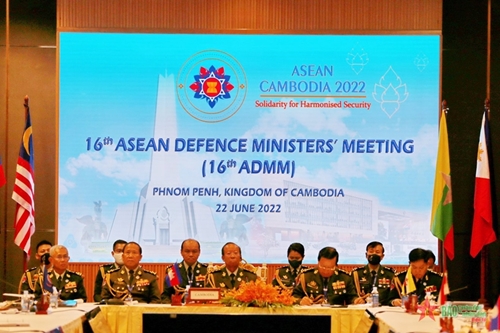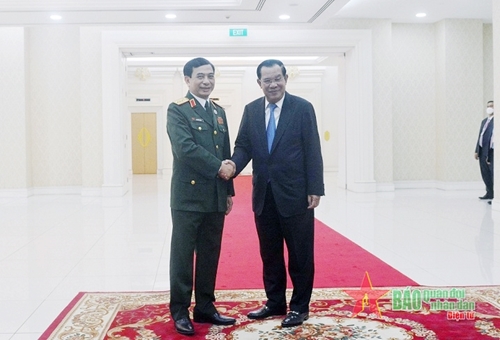During the meeting, delegates exchanged regional and international defense and security situations. They agreed on accelerating collaboration in handling such challenges in the region as terrorism, natural disasters, search and rescue, cyber security, trust-building, maritime security-related issues, safety and freedom of navigation and aviation.
    |
 |
|
At the 16th ASEAN Defense Ministers’ Meeting |
Delegates also mentioned the need to enhance cooperation in U.N. peacekeeping operations among ASEAN member states.
They agreed to recognize the role of defense organizations in addressing traditional and non-traditional security challenges and reaffirmed ASEAN's central role as the key driver in the evolving regional security architecture.
Regarding maritime security, delegates reiterated the importance of early finalizing the Code of Conduct in the East Sea (internationally South China Sea) (COC). They spoke highly of the progress in COC negotiations over the past time and confirmed the commitment of all parties to fully and effectively implementation of the Declaration on the Conduct of Parties in the East Sea (DOC).
Also at the event, delegates discussed promoting sharing of information about maritime security between the Southeast Asia Maritime Law Enforcement Initiative (SEAMLEI) and ADMM+; and the study of military history in order to promote lasting peace.
The ADMM-16 approved cooperation activities with ASEAN partners and looked into preparation for ADMM Retreat and the ninth ADMM+ slated for this November.
    |
 |
|
General Phan Van Giang (third from the left) at the event |
The meeting also adopted a joint declaration on “Solidarity for Harmonized Security” which reaffirmed the observance of principles and basic targets set in the ASEAN Charter and the Treaty of Amity and Cooperation in Southeast Asia (TAC) to enhance ASEAN centrality and solidarity and maintain a rules-based regional order in accordance with international laws for the benefit of the people.
The joint declaration also emphasized ASEAN's central role as a main driving force in enhancing defense and security cooperation and developing measures to build trust with the grouping’s partners for the common goal of maintaining peace and security and prosperity in an open, transparent and inclusive regional architecture.
The joint declaration highlighted the need to maintain and promote a favorable environment for the early finalization of an effective and substantive COC in accordance with international laws including the U.N. Convention on the Law of the Sea (UNCLOS) 1982. It also emphasized the full and effective implementation of the DOC, and welcomed trust-building initiatives and activities not within the framework of the DOC to boost communication and mutual trust.
At the meeting, head delegates approved new initiatives within the ADMM, including three concept documents on enhancing cooperation among ASEAN defense forces in controlling cross-border diseases, enhancing support mechanisms for ASEAN women peacekeepers, and establishing ASEAN Defense Educational Institutions’ Collaboration (ADEIC); terms of reference on ADMM Cyber Security and Information Center of Excellence (ACICE); and the Phnom Penh vision on the role of ASEAN defense institutions in supporting the post-COVID-19 pandemic recovery.
Also on June 22, Defense Minister Phan Van Giang and other head delegates of ASEAN member states paid a courtesy visit on Cambodian Prime Minister Hun Sen, during which Brunei Minister of Defense Bin Haji Md Yussof reported on the outcomes of the freshly-concluded ADMM-16.
    |
 |
|
Vietnamese Defense Minister Phan Van Giang and Cambodian Prime Minister Hun Sen |
Cambodian Prime Minister Hun Sen highly appreciated and hailed ASEAN defense ministers for participating in the meeting after a long period of hiatus due to COVID-19. The Cambodian government leader attributed the success of the meeting to the full attendance of defense leaders of 10 ASEAN member states, demonstrating the great efforts of ASEAN defense ministers in enhancing practical cooperation and confirming the solidarity and unity in ASEAN as well as the grouping’s central role.
Translated by Mai Huong